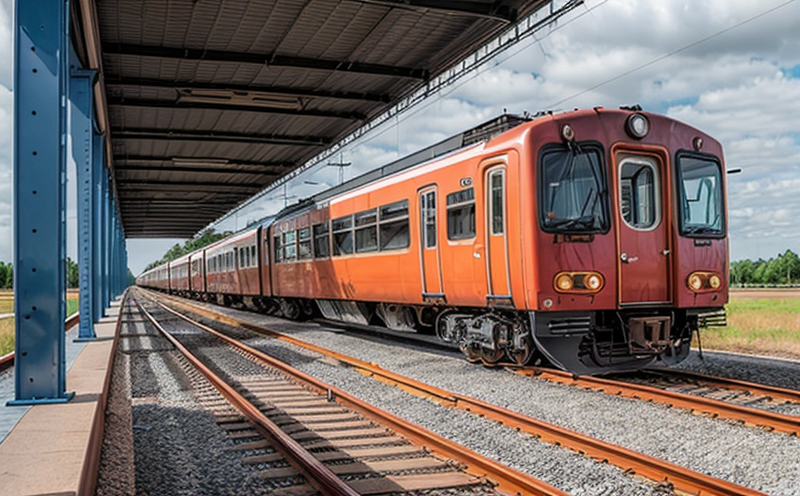Testing for Shock Resistance in Train Chassis
Testing for Shock Resistance in Train Chassis Ensuring Safety and Reliability on the Tracks
The world of rail transportation is a complex and highly regulated industry, where even the slightest compromise on safety can have catastrophic consequences. One critical aspect of ensuring train chassis meet stringent safety standards is testing their shock resistance. At Eurolab, our state-of-the-art laboratory services provide comprehensive testing solutions for train manufacturers and operators worldwide.
What is Testing for Shock Resistance in Train Chassis?
Testing for shock resistance involves subjecting train chassis to sudden impacts or shocks to assess their ability to withstand such forces without compromising structural integrity. This includes evaluating the chassiss capacity to absorb energy, maintain stability, and prevent damage to critical components.
Railway operators and manufacturers recognize that testing for shock resistance is a crucial step in ensuring compliance with regulatory requirements and industry standards. Eurolabs laboratory services cater specifically to this need, providing accurate and reliable results to support informed decision-making.
The Importance of Testing for Shock Resistance in Train Chassis
Testing for shock resistance is an essential aspect of the train manufacturing process, as it directly impacts safety, reliability, and performance on the tracks. Some key reasons why businesses rely on Eurolabs testing services include
Compliance with Regulatory Requirements Railway operators must adhere to strict guidelines set by regulatory bodies such as the International Union of Railways (UIC) or the Federal Railroad Administration (FRA). Our testing services ensure compliance with these regulations, reducing the risk of non-compliance penalties.
Reduced Maintenance and Repair Costs By identifying potential weaknesses in the chassiss shock resistance, manufacturers can address issues proactively, minimizing downtime and maintenance costs associated with damage repair.
Enhanced Passenger Safety Testing for shock resistance is critical in preventing accidents caused by structural failure or equipment malfunctions. Our services contribute to a safer traveling experience for passengers and crew members.
Advantages of Using Eurolabs Testing Services
Our comprehensive testing solutions offer numerous benefits, including
Key Benefits of Eurolabs Testing Services
Comprehensive and Accurate Results Our expert technicians utilize advanced equipment and methodologies to deliver precise and unbiased test results.
Reduced Test Cycles and Lead Times By leveraging our state-of-the-art facilities and experienced personnel, we minimize test cycles, reducing overall lead times and allowing manufacturers to accelerate production schedules.
Expert Technical Support Our team provides dedicated support throughout the testing process, offering guidance on interpretation of results and recommendations for improvement.
Scalability and Flexibility We adapt our services to meet the unique needs of clients, accommodating varying test volumes, frequencies, and types of tests.
Industry-Specific Benefits
Railway Operators Our testing services help ensure fleet safety and reliability, reducing downtime and maintenance costs while maintaining regulatory compliance.
Train Manufacturers By partnering with Eurolab, manufacturers can identify design flaws or weaknesses in the shock resistance of their chassis, making targeted improvements to meet industry standards.
Operational Benefits
Increased Efficiency Our testing services streamline the production process, enabling manufacturers to accelerate development cycles and reduce test lead times.
Cost Savings By detecting potential issues early on, clients can avoid costly redesigns or rework, minimizing financial losses associated with defective products.
QA Section
Frequently Asked Questions
What is the testing procedure for shock resistance in train chassis?
Our team employs a combination of standardized and proprietary methodologies to simulate various impact scenarios and assess the chassiss ability to withstand shocks.
How do your services ensure compliance with regulatory requirements?
We collaborate closely with clients to understand their specific needs, ensuring that our testing services align with relevant industry standards and regulations.
What types of tests are available for assessing shock resistance in train chassis?
Our comprehensive suite includes a range of tests tailored to various impact scenarios, such as drop tests, crash simulations, and dynamic loading assessments.
Common Misconceptions
Many believe that testing for shock resistance is an expensive or time-consuming process. At Eurolab, we strive to make our services accessible, flexible, and efficient.
Some assume that regulatory compliance is the sole responsibility of manufacturers. While this may be true in some cases, its essential to recognize that regulatory bodies also expect railway operators to adhere to industry standards.
Conclusion
In todays fast-paced rail transportation landscape, testing for shock resistance in train chassis has never been more critical. At Eurolab, we understand the complexities and challenges faced by manufacturers and operators alike. By leveraging our expertise, advanced facilities, and comprehensive services, clients can ensure compliance with regulatory requirements, reduce maintenance costs, and prioritize passenger safety.
Take the first step towards a safer, more efficient rail network. Contact us today to learn more about our testing solutions for shock resistance in train chassis.




